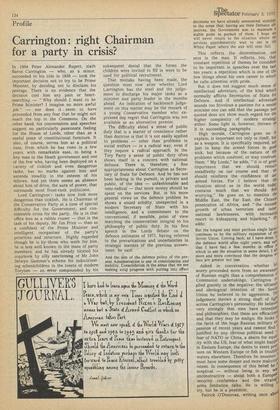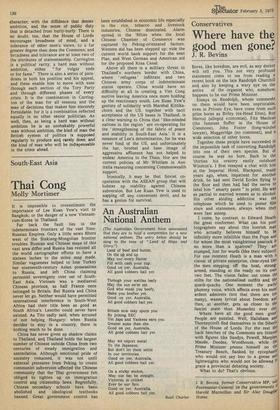Carrington: right Chairman for a party in crisis?
In 1964 Peter Alexander Rupert, sixth Baron Carrington — who, as a minor, succeeded to his title in 1938 — took the important decision not to try to be Prime Minister, by deciding not to disclaim his peerage. There is no evidence that the decision cost him any pain or heartsearching — "Why should I want to be Prime Minister? I imagine no more awful job " — nor does it . seem to have proceeded from any fear that he might not reach the top in the Commons. On the other hand, his conversation and speeches suggest no particularly passionate feeling for the House of Lords, other than as a useful piece of constitutional furniture. It also, of course, serves him as a political base, from which he has risen in a few years, with remarkable ease, to being a key man in the Heath government and one of the few who, having been deployed on a variety of ticklish and even dangerous tasks, has no marks against him and ascends steadily in the esteem of his fellows. And yet there seems an absence about him of drive, the aura of power, that surrounds most front-rank politicians. Lord Carrington'r, tasks now ,look more dangerous than ticklish. He is Chairman of the Conservative Party at a time of special difficulty for the Government; and considerable crisis for the party. He is in that office less as a rabble rouser — that is the task of his deputy, Mr Jim Prior — than as a confidant of the Prime Minister and intelligent reorganiser of the party's priorities and structure. Highly regarded though he is by those who work for him he is less well known to the mass of party members; and he has already blotted his copybook by silly sanctioning of Mr John Selwyn Gummer's scheme for indoctrinating schoolchildren in the tenets of modern Toryism — an error compounded by his subsequent denial that the forms the children were invited to fill in were to be used for political recruitment.
That mistake having been made, the question must now arise whether Lord Larrington has the steel and the judgement to discharge his major tasks as a minister and party leader in the months ahead. An indication of backbench judgement on this matter may be the remark of a young Conservative member who expressed dep regret that Carrington was not available as an alternative premier. The difficulty about a sense of public duty that is a matter of conscience rather than doctrine is that it is not easily applied to problems — other than problems in social welfare — in a radical way, even if they require a radical approach. In the Tory Party a sense of public duty often shows itself in a concern with national defence. There is, therefore, a fine appropriateness about Carrington as Secretary of State for Defence. And he has not been lacking in the pursuit, in private and public, of the idea — unfashionable and 3emi-radical — that more money should be spent on the services. But, in his more general views on the defence problem he shows a sound solidity, unexpected in a modern Secretary of State with his intelligence, and a commitment to the conventional, if sensible, point of view matching the conservatism integral to his philosophy of public duty. In his first speech in the Lords debate on the defence estimates of 1971, having referred to the prevarications and uncertainties in strategic matters of the previous government, he said:
And the aim of the defence policy of the present Administration is one of consolidation and stability. Consolidation in the sense that we are making solid progress with putting into effect decisions we have already announced: stability in the sense that, having set their Defence objectives, the Government aim to maintain a stable point in pursuit of them. I hope we will never return to the situation where the services apprehensively wait to see in the White Paper where the axe will next fall.
This reflects the determination one sees in the man. It reflects, too, that constant repetition of themes he considers to be important in speeches over the last ten years: a repetition which is one of the few things about his own career to which he calls attention with pride. But it does not suggest much sense of intellectual adventure, of the kind which normally afflicts Secretaries of State for Defence. And if intellectual adventure sounds too frivolous a pastime for a senior minister one can add that the passage just quoted does not show much regard for the higher complexity of modern strategY either. Some light is, however, thrown 00 it in succeeding paragraphs High morale, Carrington goes on to explain, is important not only in itself, but as a weapon. It is specifically required, not just to keep the armed forces in good nick, but because of the nature of the problems which confront, or may confront, them: " My Lords," he adds, " it is of great importance that we should, remal0 steadfastly on our course and that vie should reinforce the confidence of one armed forces. For I believe that the situation about us in the world tode contains much that we should find worrying." He goes on to mention the Middle East, the Far East, the Chinese penetration of Africa, and " the sinister growth of urban terrorism and inter national lawlessness, with increasing resort to kidnapping and hijacking." fle adds: But the longest and most perilous single factor continues to be the military expansion of LW Soviet Union. Coming back, as I have done, t° the defence world after eight years, and no0 that I have had a few months in office which to see the situation in some detail, I gill more and more convinced that the dangers vie face are greater not less.
Asked in conversation whether 111$ worry proceeded more from an awareneS! of Russian might than a comprehension 0' Communist undertakings, Carrington it plied gravely in the negative: the ultimate and ideological intention of the Soviet Union he believed to be aggression. ite judgement throws a strong shaft of light across Carrington's personality. He believe very strongly that men have intention and philosophies; that these are efficacioa°; and that they may be malign. He looks ° the facts of the huge Russian military elt, pansion of recent years and cannot find justified by any obvious political need "t fear of NATO or China, a desire for equal. ity with the US, fear of what might hapPe in Eastern Europe, the desire to exert pre; sure on Western Europe or fish in troubi t waters elsewhere. Therefore he assumes must have some deeper and more malicid intent. In consequence of this belief he 15 sceptical — without being in any vvev/' unconstructive — about both a Europee,c security conference and the strategre arms limitation talks. He is willing t try, but he is a pessimist. Patrick O'Donovan, writing once ab0111 the Duke of Wellington, said that Wellington "was not a Tory, which is a Passing political creed; but a Conservative, Which is an ancient philosophy." The same could be said, of Carrington. He has the pessimism of the philosophical Conservative, the scepticism about human nature of a long tradition: but it exists side by side with his sense of public duty and both, informed by his clear and rather straightforward mind, come together to Produce two of his most important Political characteristics, that tremendous and luminous patience which makes him SO formidable a negotiator; and a stubborn negative streak which prevents him from Compromising too far and makes him a Powerful last ditch defender of any Principle in which he has placed his faith. "Over my dead body," he said once — and meant it — when it was suggested to him that Government might be forced by circumstances into adopting a policy he had long opposed.
Morally, Carrington is a much deeper man than his temperament allows to appear. The temperament is a humorously diffident one. He plays himself down at every opportunity, and walks around even the most serious problem with a gleam in his eye, giving it a poke here and there and making gentle fun of it. There is a famous story of an occasion when he was First Lord of the Admiralty and when, with one of his secretaries, he went to inspect a Ship of war. The secretary was taken by the commanding officer for the Minister and Carrington went happily through the Whole routine, trotting behind his sub ordinate, making judicious observations appropriate to his supposed position, and laughing up his sleeve. That total lack of self-importance is typical and beguiling, but when one puts it side by side with the important things he does and, the deeper things he says, one realises how elusive his personality really is, and how effectively his charm and style conceal the real man. The real man is hard, uncompromising and decisive.
It *s very likely that thcse are t:-.2 qualities in him which appeal to the Prime Minister: though Heath might be less than patient with an excess of Carrington's pessimism he also undoubtedly values his Defence Secretary's charm, patience and purpose, all of which he has employed on successive intractable tasks, the latest being the chairmanship of the Conservative Party. The two men are more alike than might readily appear, though Heath is not blessed with Carrington's graces, nor afflicted with any of his doubts. What they share most of all is a streak of ruthlessness, in Heath acquired deliberately, in Carrington a part of his nature which lurks behind the front he presents to the world. Their similarities make them powerful allies and, in different circumstances, might make them implacable foes.
For Heath, of course, Carrington is invaluable, not only because of his talents and character, but because he is, being in the Lords, free to take on trouble-shooting assignments and, being in the Lords, can never be a direct rival to the Prime Minister. The base from which Carrington acts fits very well with some aspects of his character; with the diffidence that denies ambition, and the sense of public duty that is detached from hurly-burly. There is no doubt, too, that the House of Lords encourages broadness of mind, and a tolerance of other men's views, to a far greater degree than does the Commons; and brcadness and tolerance are at least two of the attributes of statesmanship. Carrington is a political rarity, a hard man without ambition, either 'for vulgar ends or for fame." There is also a series of paradoxes in both his position and his appeal, and these enable him to move with ease through each section of the Tory Party and through different phases of every crisis. It is the combination in Carrington of the man for all seasons and the man of decisions that makes him sincerely formidable. for it is a combination reflected equally in no other senior politician. As well, then, as being a hard man without ambition he is an unshakably powerful man without ambition, the kind of man the British system of politics is supposed regularly to produce and rarely does; and the kind of man who will be indispensable in the crisis ahead.




































 Previous page
Previous page